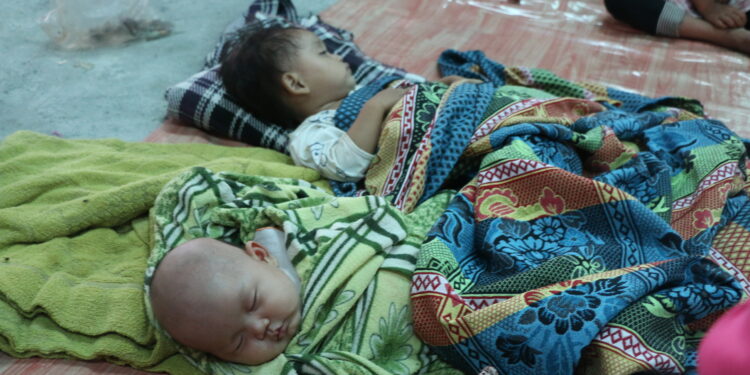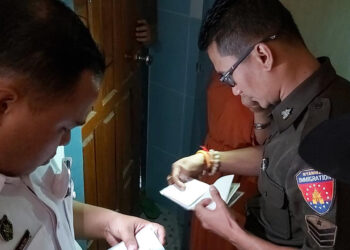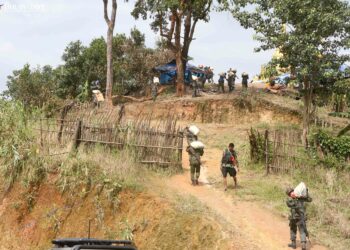CHIANG MAI, Thailand – “I feel sad when I see villagers fleeing for their lives; it reminds me of my childhood. Every time I see people displaced due to war, I remember when I fled my own home,” said Hay Plah, a former refugee who recently visited a displaced persons shelter in Myaing Gyi Ngu village in Karen State.
Fighting that broke out on Sept. 2 in Karen State between a splinter group of the Democratic Karen Benevolent Army (DKBA) armed group and a joint force of the Burma Army and the Tatmadaw-backed Border Guard Force (BGF), has forced nearly 4,000 civilians to flee their homes and seek shelter elsewhere in the area. Many of the displaced are children and women.
At a shelter known as Aye Lin Thar Yar field in Myaing Gyi Ngu, children were lying on the floor while women breastfed babies and talked idly with one another. “They seem full of fear, they daren’t talk about the fighting,” Hay Plah said.
The conflict-torn Myaing Gyi Ngu and Mae Tha Waw area of Hlaingbwe Township in Karen State’s Hpa-an District is partially controlled by different armed groups, including the Burma Army, the BGF, the Karen National Liberation Army (KNLA), and the DKBA as well as DKBA splinter groups.
Last week, joint forces of the Burma Army and the BGF seized several military bases of one splinter group. In response, the faction said that it is now using guerrilla tactics to launch counter attacks against the Burma Army and the BGF.
Maj. Saw San Aung of the group said “we are outnumbered so we don’t keep permanent bases. We will lose soldiers if we keep defending them, as we are outnumbered. Now we will stay mobile.”
The recent fighting in Karen State, also known as Kayin State, began with a disagreement over a business deal that led to the death recently of former splinter group leader Maj. Na Ma Kyar. The conflict soon escalated, with the faction releasing a statement saying that it would be opening more frontline battles. As a result, thousands of civilians have fled their homes and abandoned their houses, farmland, and belongings.
The fighting has caused the road connecting Mae Tha Waw and Myaing Gyi Ngu villages to be closed, affecting small-scale border trade businesses.
Shopkeeper Ma Kyi who runs a store in the Thai border town of Leh Hta, about three hours’ boat ride from Mae Tha Waw, said fighting has impacted her business. “It’s very quiet these days, we are not selling much. Our customers haven’t ordered any goods since the road closed,” Ma Kyi told the Irrawaddy.
Villagers in the conflict-torn area have previously accused the armed groups of extortion and coercion, for example collecting tolls or forcing villagers to carry supplies.
In 2014, clashes between a DKBA splinter group and the BGF forced 200 villagers in Mae Tha Waw village to flee across the border to Thailand. Villagers said they were threatened, arrested, detained and forced to work for the armed groups.
“I got arrested for carrying the group’s passengers,” said Pa Baut, a driver for a local transportation business. “The BGF threatened me at gunpoint, saying that they would spray my truck with bullets like rainfall if I carried those soldiers.”
“It is very hard to deny any group. They can do anything they like to us and we have no choice, all we want is to live in harmony.”
Sources close to the concerned armed groups said that the Burma Army might have other interests rather than simply attacking DKBA splinter group leaders such as Maj. Saw San Aung and Lt. Kyaw Thet who are on the Burma Army’s wanted list.
The fighting in Karen State has gained attention from the overseas Karen community. Members of the community have condemned the fighting and are angry at BGF soldiers, who are ethnic Karen, for doing the job of the Burma Army.
Meanwhile, local residents are tired of conflict that affects their safety and disrupts their daily lives.
The Mae Tha Waw area witnessed a huge military offensive by the Burma Army in 1995, forcing more than 70,000 villagers to flee. Many crossed the border to Thailand where they sought refuge in camps in Thailand’s Tak Province.
The offensive of 1995 led to the fall of the Karen National Union’s headquarters at Manerplaw, less than one hour north of Mae Tha Waw.
A Thai volunteer aid worker, Suwin, who delivered food and clothes to refugees who crossed the border into a Thai village in Tha Song Yang District, said that the refugees told him that the BGF forced young people to act as porters.
“I heard gunfire when I visited the displaced villagers. They told me that they worried that if the fighting continued they would be arrested and used as porters,” said Suwin. “Civilians are always the most vulnerable in war.”












